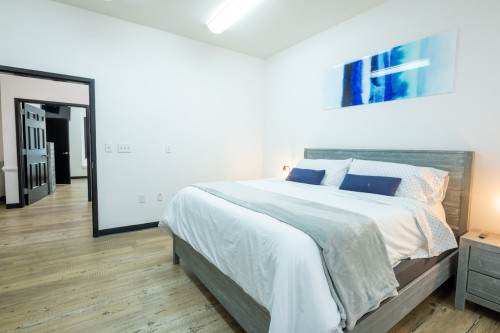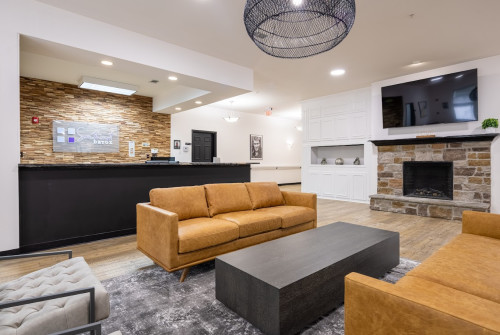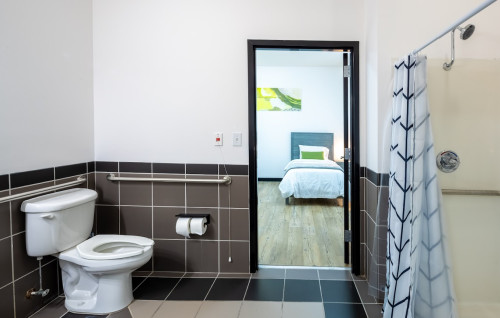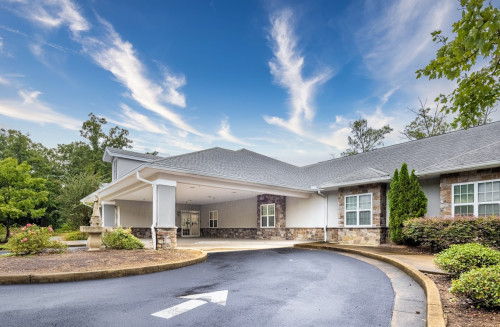








Southeast Detox Center Georgia
Verified Center
This provider's information has been quality-checked by Recovery.com's Research Team for accuracy and completeness, including center verification through appropriate third-party organizations.
Treatment Focus
This center primarily treats substance use disorders, helping you stabilize, create relapse-prevention plans, and connect to compassionate support.
Primary Level of Care
Offering intensive care with 24/7 monitoring, residential treatment is typically 30 days and can cover multiple levels of care. Length can range from 14 to 90 days typically.
Treatment Focus
This center primarily treats substance use disorders, helping you stabilize, create relapse-prevention plans, and connect to compassionate support.
Primary Level of Care
Offering intensive care with 24/7 monitoring, residential treatment is typically 30 days and can cover multiple levels of care. Length can range from 14 to 90 days typically.
Provider's Policy
At Southeast Detox, we accept most major insurance providers and some private health insurance. Our team works with your insurance provider to minimize your out-of-pocket expenses. If you don’t have insurance, we are here to help you learn what options may be available to you or a loved one.
Southeast Detox Center Georgia
Southeast Detox Center Georgia
About Southeast Detox Center Georgia
Southeast Detox illuminates the way forward for clients with substance use and co-occurring disorders. Under the guidance of skillful and caring medical professionals, clinical therapists, and recovery experts, they provide detox and residential programs to promote lasting change.
Find Strength and Create a Support System
For each client at Southeast Detox, the goal is the same— discover inner strength and build a robust support system. With the help of evidence-based therapies and medically-supervised detox, clients learn to challenge thoughts that align with their old way of thinking. They begin to recognize addiction as a persistent condition affecting brain function and behavior. Through expert guidance and peer support, clients harness their own inner strength and learn to rely on the community of peers around them who are going through the same thing.
Address Mental Health
At Southeast Detox, their dual diagnosis program provides a path to clarity and healing for those struggling with both addiction and mental health challenges. Here, clients can address anxiety, depression, and trauma. By unraveling these deep roots, clients no longer fuel the cycle of substance use. With a blend of sophisticated therapies and medical support, this program helps rebuild lives. Whether clients have experienced overwhelming sadness, racing thoughts, or past trauma, they’ll find a safe environment to help them heal from within and step into a healthier future.
Recharge and Rediscover Sense of Self
Southeast Detox offers a clean and comfortable space to provide a sense of peace and privacy as clients pursue recovery. Nourishing meals are prepared fresh on-site and catered to dietary needs. They also offer plenty of recreational activities like games, art, and outdoor spaces to help clients recharge and connect with themselves and others.

Highlights from the Center
Highlights
These highlights are provided by and paid for by the center.
Holistic Approach
Medically Assisted Detox
Private Rooms Available
Addiction Recovery
Center Overview
Treatment Focus
This center primarily treats substance use disorders, helping you stabilize, create relapse-prevention plans, and connect to compassionate support.
Joint Commission Accredited
The Joint Commission accreditation is a voluntary, objective process that evaluates and accredits healthcare organizations (like treatment centers) based on performance standards designed to improve quality and safety for patients. To be accredited means the treatment center has been found to meet the Commission's standards for quality and safety in patient care.

Southeast Detox Center Georgia
Insurance Accepted
Cash Pay Rates
Estimated Cash Pay Rate
Center pricing can vary based on program and length of stay. Contact the center for more information. Recovery.com strives for price transparency so you can make an informed decision.




Recovery.com Verified Listing
Recovery.com verified that the name, location, contact information and license to operate for this treatment provider are valid and up-to-date.

Joint Commission Accredited

Licensed by Georgia
Recovery.com is an independent, third-party mental health resource. Verification does not imply endorsement and does not guarantee the quality of treatment services.
Your Care Options
Specializations
Alcohol
Using alcohol as a coping mechanism, or drinking excessively throughout the week, signals an alcohol use disorder.
Benzodiazepines
Benzodiazepines are prescribed to treat anxiety and sleep issues. They are highly habit forming, and their abuse can cause mood changes and poor judgement.
Cocaine
Cocaine is a stimulant with euphoric effects. Agitation, muscle ticks, psychosis, and heart issues are common symptoms of cocaine abuse.
Heroin
Heroin is a highly addictive and illegal opioid. It can cause insomnia, collapsed veins, heart issues, and additional mental health issues.
Psychedelics
Hallucinogenic drugs—like LSD—cause euphoria and increased sensory experiences. When abused, they can lead to depression and psychosis.
Medication-Assisted Treatment
Combined with behavioral therapy, prescribed medications can enhance treatment by relieving withdrawal symptoms and focus patients on their recovery.
Who We Treat
Young Adults
Emerging adults ages 18-25 receive treatment catered to the unique challenges of early adulthood, like college, risky behaviors, and vocational struggles.
Men and Women
Men and women attend treatment for addiction in a co-ed setting, going to therapy groups together to share experiences, struggles, and successes.
Professionals
Busy, high-ranking professionals get the personalized treatment they need with greater accommodations for work, privacy, and outside communication.
Veterans
Patients who completed active military duty receive specialized treatment focused on trauma, grief, loss, and finding a new work-life balance.
Treatment Services
Detox
Detox fully and safely removes toxic substances from the body, allowing the next steps in treatment to begin with a clean slate.
Residential
In a residential rehab program, patients live onsite, with access to daily treatment and 24-hour care. An average stay is 30-90 days.
Approaches
Evidence-Based
A combination of scientifically rooted therapies and treatments make up evidence-based care, defined by their measured and proven results.
Holistic
A non-medicinal, wellness-focused approach that aims to align the mind, body, and spirit for deep and lasting healing.
Therapies
1-on-1 Counseling
Patient and therapist meet 1-on-1 to work through difficult emotions and behavioral challenges in a personal, private setting.
Eye Movement Therapy (EMDR)
Lateral, guided eye movements help reduce the emotional reactions of retelling and reprocessing trauma, allowing intense feelings to dissipate.
Medication-Assisted Treatment
Combined with behavioral therapy, prescribed medications can enhance treatment by relieving withdrawal symptoms and focus patients on their recovery.
Relapse Prevention Counseling
Relapse prevention counselors teach patients to recognize the signs of relapse and reduce their risk.
Twelve Step Facilitation
12-Step groups offer a framework for addiction recovery. Members commit to a higher power, recognize their issues, and support each other in the healing process.
Substances We Treat
Alcohol
Using alcohol as a coping mechanism, or drinking excessively throughout the week, signals an alcohol use disorder.
Benzodiazepines
Benzodiazepines are prescribed to treat anxiety and sleep issues. They are highly habit forming, and their abuse can cause mood changes and poor judgement.
Cocaine
Cocaine is a stimulant with euphoric effects. Agitation, muscle ticks, psychosis, and heart issues are common symptoms of cocaine abuse.
Drug Addiction
Drug addiction is the excessive and repetitive use of substances, despite harmful consequences to a person's life, health, and relationships.
Ecstasy
Ecstasy is a stimulant that causes intense euphoria and heightened awareness. Abuse of this drug can trigger depression, insomnia, and memory problems.
Heroin
Heroin is a highly addictive and illegal opioid. It can cause insomnia, collapsed veins, heart issues, and additional mental health issues.
Methamphetamine
Methamphetamine, or meth, increases energy, agitation, and paranoia. Long-term use can result in severe physical and mental health issues.
Opioids
Opioids produce pain-relief and euphoria, which can lead to addiction. This class of drugs includes prescribed medication and the illegal drug heroin.
Languages
Care Designed for Your Needs
Personal Amenities
Amenities

Learn More About the Center
Breaking the Cycle of Addiction
Understand the stages of addiction and how compassionate, medically-informed treatment can help.
Understanding Meth Metabolism
Read this comprehensive guide that breaks down metabolism and detox methods.
Admissions Process
Discover how the admissions process prioritizes each client’s needs.
Frequently Asked Questions
Find answers to the most frequently asked questions about Southeast Detox here.
What people are saying
Treatment
4.8
Accommodations
5.0
Food & Nutrition
4.8
Value
4.8
Pros
- Treated With Respect (3)
- Friendly & Competent Staff (3)
- Confidential (3)
- Supportive Aftercare (2)
Greta M
Treatment in 2025 • (7 days) • Reviewed 11/03/25
Former Client
•Small business owner
•Atlanta
Southeast Detox Center Georgia
Mandy Causey
Treatment in 2023 • (14 days) • Reviewed 04/01/23
Former Client
•Customer care specialist
•Rome ga
Robert L
Treatment in 2024 • (30 days) • Reviewed 08/05/24
Former Client
•Foreman
•Dunwoody, GA





